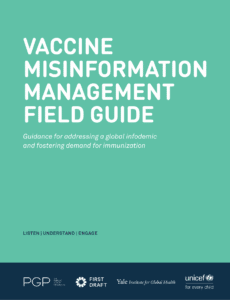Misinformation Alerts
Knowing what misinformation is being shared can help you generate effective messaging.
These insights are based on a combination of automated media monitoring and manual review by public health data analysts. Media data are publicly available data from many sources, such as social media, broadcast television, newspapers and magazines, news websites, online video, blogs, and more. Analysts from the Public Good Projects triangulate this data along with other data from fact checking organizations and investigative sources to provide an accurate, but not exhaustive, list of currently circulating misinformation.
Misinformation Alerts
Knowing what misinformation is being shared can help you generate effective messaging.
These insights are based on a combination of automated media monitoring and manual review by public health data analysts. Media data are publicly available data from many sources, such as social media, broadcast television, newspapers and magazines, news websites, online video, blogs, and more. Analysts from the Public Good Projects triangulate this data along with other data from fact checking organizations and investigative sources to provide an accurate, but not exhaustive, list of currently circulating misinformation.Alerts are categorized as high, medium, and low risk.
- High risk alerts: Narratives with widespread circulation across communities, high engagement, exponential velocity, and a high potential to impact health decisions. Are often more memorable than accurate information.
- Medium risk alerts: Narratives that are circulating in priority populations and pose some threat to health. Potential for further spread due to the tactics used or because of predicted velocity. Often highlights the questions and concerns of people.
- Low risk alerts: Narratives that are limited in reach, don’t impact your community, or lack the qualities necessary for future spread. May indicate information gaps, confusion, or concerns.
The false, meaningless claim that COVID-19 vaccines are “98 times” more harmful than COVID-19 is being circulated by right-wing blogs, social media accounts, and a popular conspiracy web broadcast. The claim is based not on a scientific study but on a non-peer reviewed risk-benefit analysis of COVID-19 boosters for university students.
Recommendation: Explaining that the analysis is flawed and that it is being misrepresented by vaccine opponents is recommended. The analysis claims that COVID-19 boosters for young adults are unethical because the boosters could potentially cause harm to individual young adults. There is no scientific evidence to support the conclusions of the analysis or the claim that serious adverse events from vaccination are more frequent than serious complications from COVID-19 infection. Posts about the analysis have also misrepresented the study to suggest that it refers to all COVID-19 vaccines instead of boosters. Fact Checking Source(s): 
A U.S. senator used a clip of Dr. Anthony Fauci saying that natural immunity is better than vaccination in an attempt to discredit the National Institute of Allergy and Infectious Diseases Director. The senator, who frequently promotes vaccine misinformation, claims that the video is proof that Dr. Fauci lied about the effectiveness of natural immunity against COVID-19.
Recommendation: Emphasizing that this short clip misrepresents Dr. Fauci’s full statement to imply that he is lying about the necessity of COVID-19 vaccines is recommended. In the full video, Dr. Fauci is not speaking about COVID-19 but is answering a caller's question about getting the flu shot after being diagnosed with the flu. Although flu shots are currently recommended after a flu infection, when this video was recorded nearly 20 years ago, our understanding of respiratory illnesses like the flu and the available vaccines was not as advanced as it is now. Consider countering misinformation about natural immunity by explaining that COVID-19 infection does not provide reliable protection against COVID-19 and is not a substitute for vaccination. Emphasizing that COVID-19 vaccination is the safest and most reliable way to gain protection is recommended. Fact Checking Source(s): 
The false claim that Denmark banned COVID-19 vaccination for those under 50 has been circulating on social media for the past week. Many posts insinuate that the vaccines are being banned due to safety concerns.
Recommendation: Emphasizing that the posts are a misrepresentation of Denmark’s policy is recommended. Denmark’s national vaccine program has shifted its focus to boosters for people who are at the highest risk for severe illness, including people over the age of 50 and people of all ages who are immunocompromised. The decision had nothing to do with safety concerns, as evidenced by the fact that the government is aiming to administer boosters to around half the population. Fact Checking Source(s): 
A conspiracy news article claims that a group of over 400 doctors, scientists, and health professionals have declared an international medical crisis due to COVID-19 vaccine injuries. The article has been shared by several high-profile social media accounts.
Recommendation: Messaging may emphasize that data from clinical trials and large-scale studies in millions of people worldwide have shown repeatedly that COVID-19 vaccines are safe. The “declaration,” the latest attempt by vaccine opponents to cast doubts on the safety of COVID-19 vaccines, consists of a statement about supposed vaccine injuries based on unverified reports in vaccine monitoring systems. Anyone can sign the declaration without verification of credentials. Continuing to emphasize key messages is recommended: COVID-19 vaccines are safe and effective. Nearly two-thirds of the world’s population has been fully vaccinated safely, with over 12 billion doses administered. Fact Checking Source(s): 
A social media post claims that the U.S. government signed an agreement with Moderna about COVID-19 vaccines shortly before the pandemic. The post includes a video of a political commentator falsely claiming that the NIH has joint ownership of the Moderna vaccine and helped orchestrate the pandemic for profit.
Recommendation: Emphasizing that the claims in the video are false and based on a misrepresentation of the facts is recommended. The video originally circulated and was debunked in December. The allegations in the video are based on a 2019 agreement between Moderna and the NIH to develop a vaccine for MERS, a coronavirus that is related to but genetically distinct from the virus that causes COVID-19. Prior to 2019, coronaviruses had caused multiple serious outbreaks, including the 2002-2004 SARS outbreak and the 2012 MERS outbreak. No U.S. government agency has ownership of any COVID-19 vaccines. Fact Checking Source(s): 
A social media post falsely claims that 32 Canadian doctors “died suddenly” after receiving the COVID-19 vaccine. The post does not provide any evidence that the vaccines were linked to the deaths.
Recommendation: Messaging may emphasize that the attempt to link the deaths to COVID-19 vaccines is completely baseless and includes misleading information about several of the doctors. In the case of three doctors who are described as having died suddenly after receiving boosters, all died from cancer or other long-term, serious illnesses. Their deaths, while tragic, were not “sudden” and were not caused by the vaccines. Fact-checking sources:
A video shares the results of a CDC report that found that more than half of children under the age of 2 experienced systemic reactions to the COVID-19 vaccine. The report examined VAERS responses for infants and toddlers after COVID-19 vaccines were approved for the age group.
Recommendation: Messaging may explain that systemic reactions to vaccination are normal for every age group, including infants and toddlers. The vast majority of the reports were mild, with the most commonly reported reactions being crying, irritability, fever, sleepiness, and fatigue, which is in line with the reactions observed to other childhood vaccines. Fact-checking sources:
Multiple social media accounts have shared an article from a conspiracy website that claims the Israeli government covered up COVID-19 vaccine injuries in official reports. The only evidence to support this claim is several short video clips of what appears to be an advisory committee discussing vaccine safety. Some posts falsely claim that Israel’s Ministry of Health did not begin monitoring COVID-19 vaccine safety until a year after the vaccines were introduced.
Recommendation: Selective editing of advisory committee meetings and other scientific forums is an established tactic of vaccine opponents and conspiracy theorists. When experts convene in order to advise on vaccine policy they intentionally address safety concerns. In these forums it is not uncommon for open-ended questions to be asked, as well as thought exercises where participants examine a potential risk from multiple angles. Viewers who are not experts themselves, or who wish to selectively edit the proceedings to over-emphasize the concerns of experts, can find discussion of vaccine injuries. This is the point of these forums: Potential risks are weighed against all available evidence on safety and the overall benefit to populations. Emphasizing that the context of the clips is unclear because they do not contain any full, unedited videos and only feature images of a slideshow with voices that are identified on screen as ministry of health officials and researchers is recommended. There is no evidence that the safety concerns discussed in the clips were related to or caused by the vaccine. Israel monitored potential adverse events through its vaccine safety reporting system with such thoroughness that it was able to identify myocarditis as a potential vaccine risk before it was flagged by any other country. Fact-checking sources:
Viral social media posts are falsely claiming that ivermectin is an approved COVID-19 treatment, while vaccines and masks have failed. The most common claim is that the National Institutes of Health recently added ivermectin to the list of drugs approved to treat COVID-19.
Recommendation: Emphasizing that the claims about ivermectin are misleading is recommended. No health authority has approved ivermectin to treat COVID-19. The NIH has been evaluating the medication as a potential COVID-19 treatment for over a year, and the guidelines about the drug have not changed in that time. Organizations may consider explaining that no reputable, peer-reviewed study has found ivermectin to be effective at preventing or treating COVID-19. The largest randomized, controlled trial of ivermectin to date found that the treatment had no effect on COVID-19 hospitalization in over 1,300 participants. Fact Checking Source(s): 
Several social media posts shared an image of an outdated U.K. government document advising against COVID-19 vaccination in women who are pregnant or breastfeeding due to a lack of safety data. The posts falsely claim that the government recently updated its guidance and is no longer recommending the vaccine for this population.
Recommendation: This particular misinformation has been circulating online for months and reemerged in the last week. The image is from the Medicines and Healthcare Products Regulatory Agency (MHRA) website, which published a summary document in December 2020 following the approval of the Pfizer vaccine. Archived versions of the site show it has not been updated since then. The U.K. government has recommended since April 2020 that pregnant and breastfeeding women get vaccinated against COVID-19. Consider countering the false claims by emphasizing that multiple studies have shown that COVID-19 vaccines are safe during pregnancy. Fact Checking Source(s): 
Alerts are categorized as high, medium, and low risk.
- High risk alerts: Narratives with widespread circulation across communities, high engagement, exponential velocity, and a high potential to impact health decisions. Are often more memorable than accurate information.
- Medium risk alerts: Narratives that are circulating in priority populations and pose some threat to health. Potential for further spread due to the tactics used or because of predicted velocity. Often highlights the questions and concerns of people.
- Low risk alerts: Narratives that are limited in reach, don’t impact your community, or lack the qualities necessary for future spread. May indicate information gaps, confusion, or concerns.
Vaccine Misinformation Guide
Get practical tips for addressing misinformation in this new guide. Click image to download, or see highlights.

